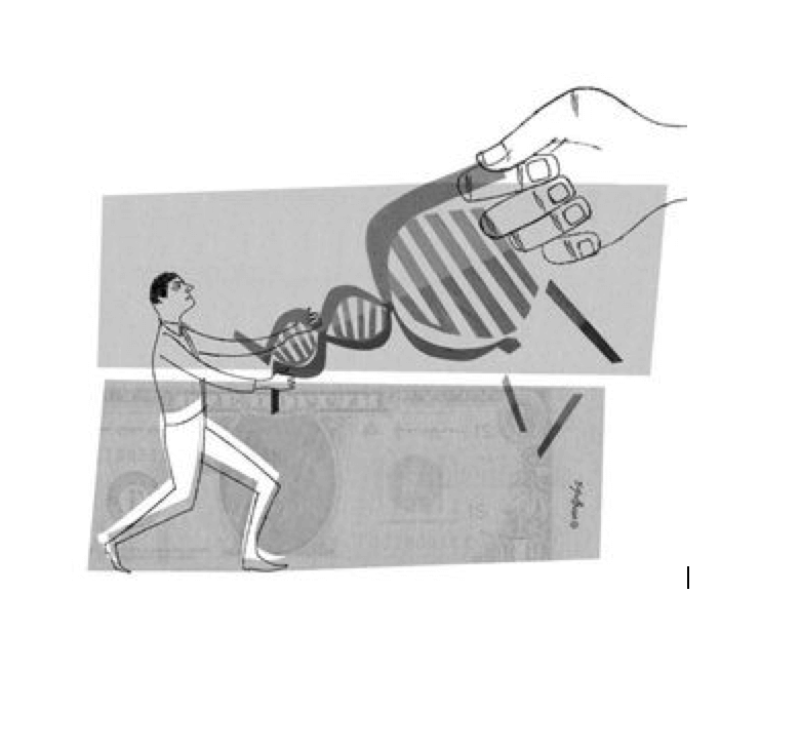A blanket. A weight. An anchor. These are all words patients have used to describe major depression, one of the most common mental health disorders.
In 2014, the National Institutes of Mental Health estimated that 15.7 Americans suffered from clinical depression each year. Bernice, a person with major depression, writes about day to day living with the disease:
With major depression, it was like being in another world. I would see others around me smiling, and enjoying things that they were doing, but I couldn’t be the same way. There was always a part of me that was missing…I sought treatment for depression when I realized that my daily obligations were suffering and not getting done in the proper way that they should have. Not only did I quit taking care of things for myself, but also for others who depended on me.
A new study used volunteered data from customers of the direct-to-consumer genetics testing company 23andMe to identify 15 spots in the genome that increase a person’s risk of developing the major depressive disorder. Eighty percent* of the over 1 million 23andMe customers have agreed to release their genetic information for anonymized research by filling out personal health questionnaires. Antonio Regalado at Tech Review:
23andMe has sold more than a million gene-test kits. The product, costing $199, is mostly for entertainment, like finding out about one’s ethnic background. But more than half of its customers have agreed to allow their DNA to be used in further research and answer survey questions about their health. Through its surveys, the company was able to locate more than 141,000 people who said they’d been diagnosed with depression. That is about 10 times more than the next-largest depression study ever carried out.
The genomes of those 141,000 people with depression were compared to 337,000* controls, 23andMe customers who reported never having depression. The gene spots were then analyzed in another set of both people with and without depression to see if they could predict the risk of depression.
They did.
The study, the largest genome-wide association study of depression to date, is the latest example of important research to come out of 23andMe’s customer base. 23andMe has always said research is a foundational aspect of their business. The company has achieved a lot by working with outside companies and academic research groups. From Ariana EunJung Cha at the Washington Post:
The decision to open up the company’s data and collaborate with outside researchers is one of the most important decisions that 23andMe founder Anne Wojcicki made when she started the company and one that has made the modest-sized Silicon Valley venture one of the most important players in the field of genetics.
The study author’s said the 17 single nucleotide polymorphisms (SNPs) identified were found near or in genes that control development and regulation of the central nervous system. One variant was located between two brain genes MEF2C and TMEM161B. Variants of MEF2C are associated with epilepsy and intellectual disability according to 23andMe.
Finding genes that link to disease can help researchers unravel the underlying biology that causes conditions like depression. Next, scientists can look at the effect of these SNPs on gene function. From GenomeWeb:
Identifying genes that affect risk for a disease is a first step towards understanding the disease biology itself, which gives us targets to aim for in developing new treatments, Roy Perlis [an author of the study] explained. More generally, finding genes associated with depression should help make clear that this is a brain disease, which we hope will decrease the stigma still associated with these kinds of illnesses.
Major depression is hard to treat. Drugs and cognitive behavioral therapy don’t work for everyone. For 30 percent of people with depression neither work. The drugs we do have are increasingly being scrutinized for their effectiveness and dangerous side effects like suicide. Although we know how selective serotonin re-uptake inhibitors change brain chemistry, we don’t know how that translates to relieve symptoms on a biochemical level.
This 23andMe study focused on depression in people of European descent. The genetic loci it identified are different than the two identified in Chinese women with depression published last year. This means different genes may be affecting depression both within and between populations. That makes the complicated picture of major depressive disorder potentially murkier. It also suggests a future in which personalized, genotype-matched healthcare could be used to best fit mental health treatments to patients.
Meredith Knight is a contributor to the human genetics section for Genetic Literacy Project and a freelance science and health writer in Austin, Texas. Follow her @meremereknight.
*8/8/2016 This article was corrected to reflect the following: There were 337,000 control participants and 450,000 total participants involved in the study. Eighty percent of 23andMe customers participate in research.































